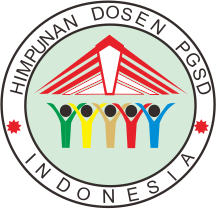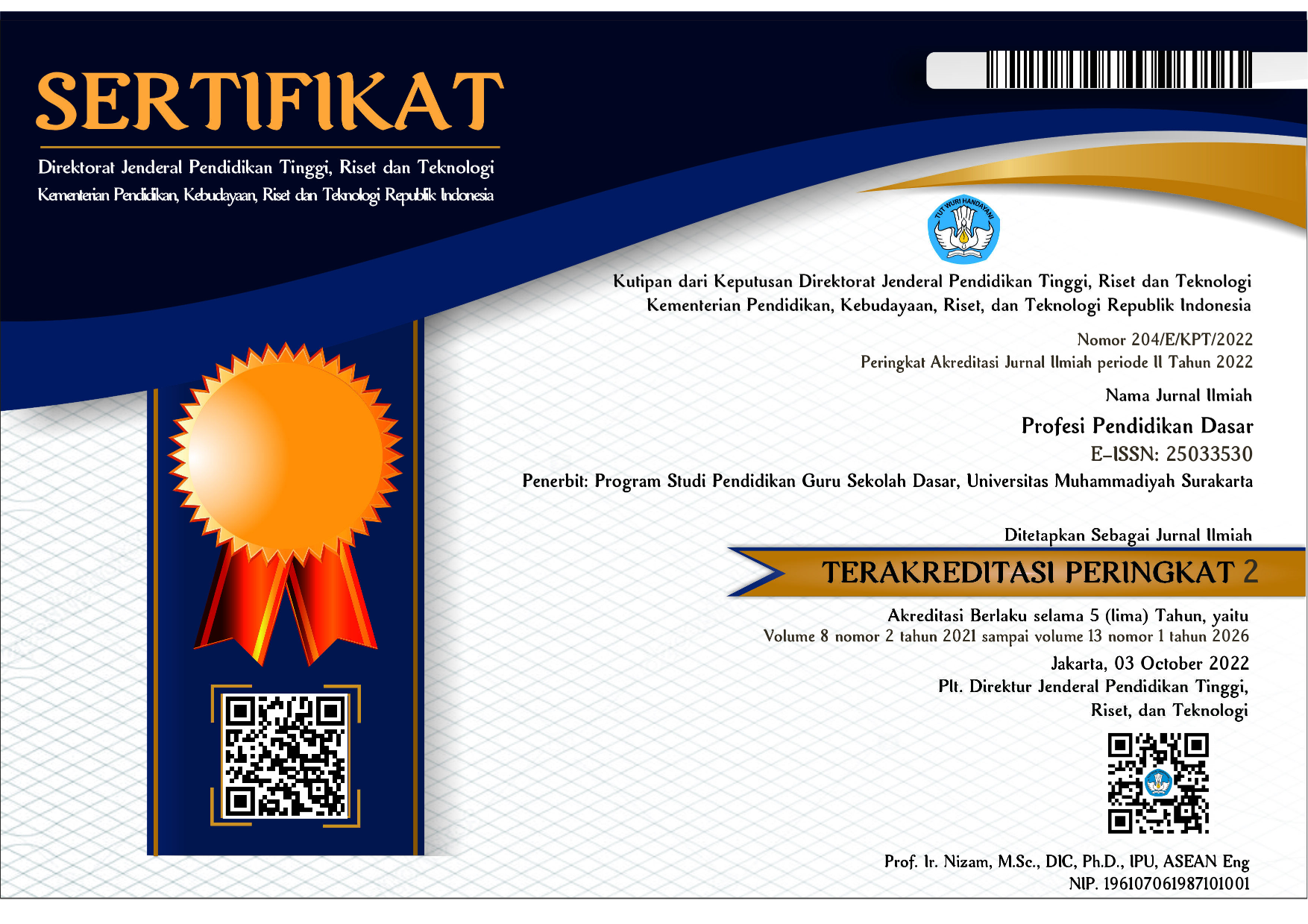IDENTIFIKASI PENGETAHUAN DAN KETERAMPILAN PERLINDUNGAN DIRI ANAK DARI PELECEHAN SEKSUAL DI SD MUHAMMADIYAH 1 SURAKARTA
Murfiah Dewi Wulandari(1), Andina Widhayanti(2*), Achmad Fathoni(3), Muhammad Abduh(4), Muhamad Taufik Hidayat(5)(1)
(2)
(3)
(4)
(5)
(*) Corresponding Author
Abstract
The purposes of this research are to 1) identify knowledge of children's personal protection from sexual abuse; 2) identifying children's personal protection skills from sexual abuse; and 3) describe efforts to prevent sexual abuse that have been carried out by the school. This type of research is descriptive qualitative research. This research was conducted at SD Muhammadiyah 1 Surakarta. The research subjects were fifth grade students. The technique of collecting data are through observation, interviews, and documentation. Qualitative data analysis techniques use the concepts conveyed by Miles and Hubermen. The validity of the data was obtained through source triangulation and technical triangulation. The results of the research indicate that 1) the child's ability to identify appropriate touch situations is good and the child's ability to identify touch situations that are not appropriate is very good. This are indicated by the child knowing that the appropriate touches such as the touch of the parents when caring for the body, the touch of doctors and nurses when examining the disease and inappropriate touches such as the touch of a housemaid or neighbor; 2) the child's knowledge and skills in reporting are very low, this are indicated by the child being unable to tell other people and children protect themselves by shouting, angry and running; 3) school prevention efforts have been carried out by schools through health education on reproduction and puberty in two stages, namely in the health and religious.
Keywords
Full Text:
PDFReferences
Abduh, Muhammad dan Wulandari D. Murfiah. (2016). Model Pendidikan Seks pada Anak Sekolah Dasar Berbasis Teori Perkembangan Anak. The Progressive and Fun Education Seminar. ISBN: 978-602-361-045-7 403-411
Akbar, Zalina dkk. (2014). Program Pendidikan Seks untuk Meningkatkan Proteksi Diri dari Eksploitasi Seksual pada Anak Usia Dini. Jurnal Parameter Vol 25 No. 2 doi: org10.21009/parameter252.07
Alicia Hurtado, MD. (2014). Children’s Knowledge of Sexual Abuse Prevention in El Salvador. Icahn School of Medicine at Mount Sinai: Annals of Global Health
Bartz, T. (2007). Sex education in multicultural Norway. Sex Education, 7(1), 17–33. https://doi.org/http://dx.doi.org/10.1080/14681810601134702
Beach, S. R. H., Brody, G. H., Lei, M. K., Gibbons, F. X., Gerrard, M., Simons, R. L., … Philibert, R. a. (2013). Impact of child sex abuse on adult psychopathology: A genetically and epigenetically informed investigation. Journal of Family Psychology, 27(1), 3–11. https://doi.org/10.1037/a0031459
Bennett, L. R. (2007). Zina and the enigma of sex education for Indonesian Muslim youth. Sex Education, 7(4), 371–386. https://doi.org/10.1080/14681810701635970
Bily. (2019). Tahun Lalu Kekerasan Seksual Dominasi Kasus Anak yang Berhadapan dengan Hukum. Diakses pada 5 Maret 2019 http://www.tribunnews.com/nasional/2019/01/09/tahun-lalu-kekerasan-seksual-dominasi-kasus-anak-yang-berhadapan-dengan-hukum.
Buck, A., & Parrotta, K. (2014). Students teach sex education: introducing alternative conceptions of sexuality. Sex Education, 14(1), 67–80. https://doi.org/10.1080/14681811.2013.830968
Darmadi, Hamid. (2013). Metode Penelitian Pendidikan dan Sosial. Bandung: Alfabeta
Esya Anesty, Mashudi. (2015). Pencegahan Kekerasan Seksual Pada Anak Melalui Pengajaran Personal Safety Skills. Jurnal Metode Didaktik
Islawati, I., & Paramastri, I. (2015). Program “Jari Peri” sebagai Pelindung Anak dari Kekerasan Seksual. Jurnal Psikologi, 42, No. 2(2), 115–128.
Kenny, C. Maureen. Dan R., Reena. (2008). Child Sexual Abuse: From Prevention to Self-Protection. Wiley InterScience: 36-54: DOI: 10.1002/car.1012
Kerley, Dina SR. (2015). Hubungan Karakteristik Orang Tua dengan Pengetahuan Orang Tua tentang Kekerasan Seksual pada Anak Usia Prasekolah di Kelurahan Grogol Selatan Kebayoran Lama Jakarta Selatan. Skripsi, FKIP. Universitas Islam Negeri Syarif Hidayatullah.
Kenny, M. C., Wurtele, S. K., Alonso, L., Kenny, M. C., Wurtele, S. K., & Evaluation, L. A. (2012). Evaluation of a Personal Safety Program with Latino Preschoolers Evaluation of a Personal Safety Program with Latino Preschoolers, 8712(October). https://doi.org/10.1080/10538712.2012.675426
Kwako, L. E., Noll, J. G., Putnam, F. W., & Trickett, P. K. (2010). Childhood sexual abuse and attachment: An intergenerational perspective. Clinical Child Psychology and Psychiatry, 15(3), 407–422. https://doi.org/10.1177/1359104510367590
Maradewa, Rega. (2019). “KPAI: 67 Persen Kekerasan Bidang Pendidikan Terjadi di Jenjang SD” Diakses pada 19 Juli 2019 http://www.kpai.go.id/berita/kpai-67-persen-kekerasan-bidang-pendidikan-terjadi-di-jenjang-sd
Martínez L., J., Carcedo J., R., Fuertes, A., Vicario-Molina, I., Fernández-Fuertes A., A., Orgaz, B., … Fernández-Fuertes A., A. (2012). Sex education in Spain: teachers’ views of obstacles. Sex Education, 12(4), 425–436. https://doi.org/10.1080/14681811.2012.691876
Mkumbo, K. a. (2014). Students’ attitudes towards school-based sex and relationships education in Tanzania. Health Education Journal, 73(6), 642–656. https://doi.org/10.1177/0017896913510426
Muzdalifah, R. A., & Wulandari, M. D. (2018). Upaya Pencegahan Kekerasan Seksual Terhadap Anak Oleh Pelayanan Terpadu Perempuan Dan Anak Surakarta (PTPAS) Di Kota Surakarta. Evolution, 1–14.
Naz, R. (2014). Sex Education in Fiji, 664–687. https://doi.org/10.1007/s12119-013-9204-3
Paramastri, I., & Priyanto, M. A. (2010). Early Prevention Toward Sexual Abuse on Children, 37(1), 1–12.
Sarno, Julie & Wurtele, S. (1997). Effects of a personal safety program on preschoolers’ knowledge, skill, and perceptions of child sexsual abuse. Child Maltreatment, 2.
Suyanto, B. (2018). Problem Pendidikan dan Anak Korban Tindak Kekerasan. Yogyakarta: Suluh Media.
Topping, K., & Barron, I. (2009). School-based child sexual abuse prevention programmes: A review of effectiveness, 79(1), 431–463. https://doi.org/10.3102/0034654308325582
Walsh, K., Zwi, K., Woolfenden, S., & Shlonsky, A. (2015). School-Based Education Programs for the Prevention of Child Sexual Abuse: A Cochrane Systematic Review and Meta-Analysis. Research on Social Work Practice, 1–23. https://doi.org/10.1177/1049731515619705
Wilson, H. W., & Widom, C. S. (2010). Does physical abuse, sexual abuse, or neglect in childhood increase the likelihood of same-sex sexual relationships and cohabitation? A prospective 30-year follow-up. Archives of Sexual Behavior, 39(1), 63–74.
Wurtele, S.K., Hughes, J. & Owens, J. S. (1998). An Examination of the Reliability of the “What If” Situations Test: A Brief Report. Child Sexual Abuse.
Zhang, W., Chen, J., Feng, Y., Li, J., Zhao, X., & Luo, X. (2013). Young children’s knowledge and skills related to sexual abuse prevention: A pilot study in Beijing, China. Child Abuse & Neglect. https://doi.org/10.1016/j.chiabu.2013.04.018
Article Metrics
Abstract view(s): 1687 time(s)PDF: 2282 time(s)
Refbacks
- There are currently no refbacks.


















